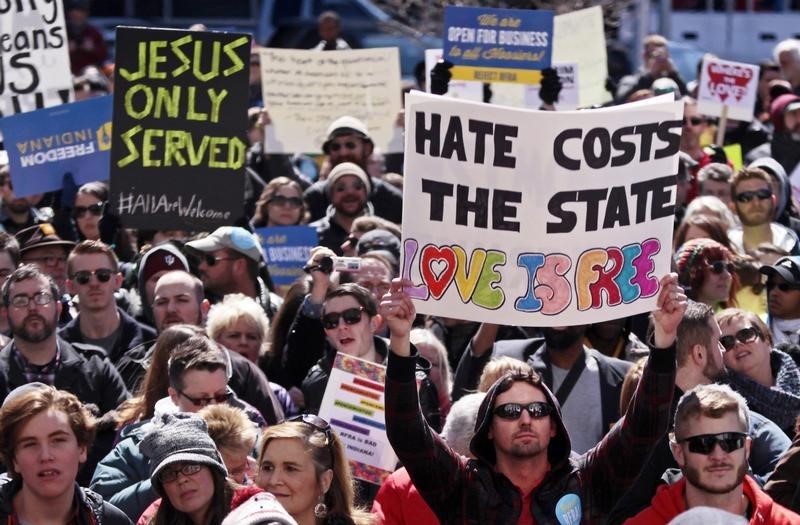By Steve Barnes
LITTLE ROCK, Ark. (Reuters) - Indiana and Arkansas revised on Thursday new religious freedom acts that had drawn criticism from rights groups and U.S. companies that assailed them as discriminatory against gays.
Arkansas Governor Asa Hutchinson, a Republican, signed his state's Religious Freedom Restoration Act into law minutes after it passed in the statehouse.
Indiana Governor Mike Pence, also a Republican, signed a revised religious freedom law that amended one he signed last week. The original measure catapulted the state into a firestorm because it lacked specific provisions to prevent denial of services and other discrimination against gays.
The state drew the ire of companies like Apple Inc (NASDAQ:AAPL), boycotts of official travel by the states of New York and Connecticut, and protests by civil liberties groups and individuals from around the country.
Some local politicians and the state's largest newspaper, the Indianapolis Star, called for an immediate fix to the bill, fearing it would pummel the state's economy and create the perception that Indiana was intolerant of certain groups.
"In the midst of this furious debate, I have prayed earnestly for wisdom and compassion, and I have felt the prayers of people across this state and across this nation," Pence said in a statement.
Pence did not mention gender identity or sexual orientation in the statement.
As pressure built against Indiana, legislators in Arkansas prepared to vote on that state's RFRA, and Hutchinson came under pressure from Wal-Mart Stores Inc (NYSE:WMT), the world's largest retailer, concerned the bill would send the wrong message about the state. Wal-Mart is headquartered in Arkansas.
Hutchinson said the state had crafted an "Arkansas solution" meant to make the state's religious freedom law more closely mirror a federal law that had been signed by former President Bill Clinton, a Democrat.
"It recognizes the diversity and culture of our workforce and protects religious freedom," Hutchinson said.
Critics have said the measures were part of a broader effort in socially conservative states to push back against a series of U.S. court decisions allowing same-sex marriage. The U.S. Supreme Court is set to take up the issue this month.
Supporters have said the laws do not allow for discrimination and are needed to protect religious freedom.
Twenty U.S. states and the federal government have RFRAs, which allow individuals to sue the government if they believe their First Amendment religious rights have been violated.
The original measures in Indiana and Arkansas go further than all but that of Texas, allowing lawsuits between private parties. The Texas law also includes provisions that it cannot be used to violate civil rights.
That raised the possibility of businesses using the law as a defense if they are sued, such as realtors for refusing to show homes to a member of the LGBT community or caterers if they rejected a request to provide for a same-sex wedding.
In Indiana, lawmakers flanked by gay-rights activists unveiled changes to protect civil liberties. Thursday's news conference was a dramatic turnaround from Pence's signing act, which was attended by some religious activists who decried homosexuality as a mortal sin.
The rewritten Indiana proposal specifies that it does not authorize a provider to refuse to do business with anyone on the basis of "race, color, religion, ancestry, age, national origin, disability, sex, sexual orientation, gender identity or United States military service."

However, churches and religious organizations are exempt, which could allow them to use the law as a defense if they were sued by an individual claiming discrimination.